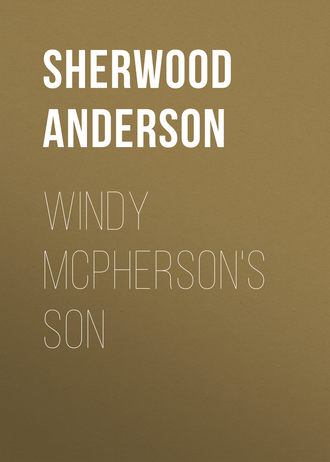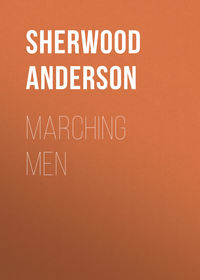 полная версия
полная версияWindy McPherson's Son
All during that month and into the next Sam stayed with the old man’s gang. He ceased thinking, and only worked desperately. An odd feeling of loyalty and devotion to the old man came over him and he felt that he too must prove that he had the juice in him. At the hotel he went to bed immediately after the silent dinner, slept, awoke aching, and went to work again.
One Sunday one of the men of his gang came to Sam’s room and invited him to go with a party of the workers into the country. They went in boats, carrying with them kegs of beer, to a deep ravine clothed on both sides by heavy woods. In the boat with Sam sat the red-haired young man, who was called Jake and who talked loudly of the time they would have in the woods, and boasted that he was the instigator of the trip.
“I thought of it,” he said over and over again.
Sam wondered why he had been invited. It was a soft October day and in the ravine he sat looking at the trees splashed with colour and breathing deeply of the air, his whole body relaxed, grateful for the day of rest. Jake came and sat beside him.
“What are you?” he asked bluntly. “We know you are no working man.”
Sam told him a half-truth.
“You are right enough about that; I have money enough not to have to work. I used to be a business man. I sold guns. But I have a disease and the doctors have told me that if I do not work out of doors part of me will die.”
The man from his own gang who had invited him on the trip came up to them, bringing Sam a foaming glass of beer. He shook his head.
“The doctor says it will not do,” he explained to the two men.
The red-haired man called Jake began talking.
“We are going to have a fight with Ed,” he said. “That’s what we came up here to talk about. We want to know where you stand. We are going to see if we can’t make him pay as well for the work here as men are paid for the same work in Chicago.”
Sam lay back upon the grass.
“All right,” he said. “Go ahead. If I can help I will. I’m not so fond of Ed.”
The men began talking among themselves. Jake, standing among them, read aloud a list of names among which was the name Sam had written on the register at Ed’s hotel.
“It’s a list of the names of men we think will stick together and vote together on the bond issue,” he explained, turning to Sam. “Ed’s in that and we want to use our votes to scare him into giving us what we want. Will you stay with us? You look like a fighter.”
Sam nodded and getting up joined the men about the beer kegs. They began talking of Ed and of the money he had made in the town.
“He’s done a lot of town work here and there’s been graft in all of it,” explained Jake emphatically. “It’s time he was being made to do the right thing.”
While they talked Sam sat watching the men’s faces. They did not seem vile to him now as they had seemed that first evening in the hotel office. He began thinking of them silently and alertly at work all day long, surrounded by such influences as Ed and Bill, and the thought sweetened his opinion of them.
“Look here,” he said, “tell me of this matter. I was a business man before I came here and I may be able to help you fellows get what you want.”
Getting up, Jake took Sam’s arm and they walked down the ravine, Jake explaining the situation in the town.
“The game,” he said, “is to make the taxpayers pay for a millrace to be built for the development of the water power in the river and then, by a trick, to turn it over to a private company. Bill and Ed are both in the deal and they are working for a Chicago man named Crofts. He’s been up here at the hotel with Bill talking to Ed. I’ve figured out what they are up to.” Sam sat down upon a log and laughed heartily.
“Crofts, eh?” he exclaimed. “Say, we will fight this thing. If Crofts has been up here you can depend upon it there is some size to the deal. We will just smash the whole crooked gang for the good of the town.”
“How would you do that?” asked Jake.
Sam sat down on a log and looked at the river flowing past the mouth of the ravine.
“Just fight,” he said. “Let me show you something.”
He took a pencil and slip of paper from his pocket, and, with the voices of the men about the beer kegs in his ears and the red-haired man peering over his shoulder, began writing his first political pamphlet. He wrote and erased and changed words and phrases. The pamphlet was a statement of facts as to the value of water power, and was addressed to the taxpayers of the community. He warmed to the subject, saying that a fortune lay sleeping in the river, and that the town, by the exercise of a little discretion now, could build with that fortune a beautiful city belonging to the people.
“This fortune in the river rightly managed will pay the expenses of government and give you control of a great source of revenue forever,” he wrote. “Build your millrace, but look out for a trick of the politicians. They are trying to steal it. Reject the offer of the Chicago banker named Crofts. Demand an investigation. A capitalist has been found who will take the water power bonds at four per cent and back the people in this fight for a free American city.” Across the head of the pamphlet Sam wrote the caption, “A River Paved With Gold,” and handed it to Jake, who read it and whistled softly.
“Good!” he said. “I will take this and have it printed. It will make Bill and Ed sit up.”
Sam took a twenty-dollar bill from his pocket and gave it to the man.
“To pay for the printing,” he said. “And when we have them licked I am the man who will take the four per cent bonds.”
Jake scratched his head. “How much do you suppose the deal is worth to Crofts?”
“A million, or he would not bother,” Sam answered.
Jake folded the paper and put it in his pocket.
“This would make Bill and Ed squirm, eh?” he laughed.
Going home down the river the men, filled with beer, sang and shouted as the boats, guided by Sam and Jake, floated along. The night fell warm and still and Sam thought he had never seen the sky so filled with stars. His brain was busy with the idea of doing something for the people.
“Perhaps here in this town I shall make a start toward what I am after,” he thought, his heart filled with happiness and the songs of the tipsy workmen ringing in his ears.
All through the next few weeks there was an air of something astir among the men of Sam’s gang and about Ed’s hotel. During the evening Jake went among the men talking in low tones, and once he took a three days’ vacation, telling Ed that he did not feel well and spending the time among the men employed in the plough works up the river. From time to time he came to Sam for money.
“For the campaign,” he said, winking and hurrying away.
Suddenly a speaker appeared and began talking nightly from a box before a drug store on Main Street, and after dinner the office of Ed’s hotel was deserted. The man on the box had a blackboard hung on a pole, on which he drew figures estimating the value of the power in the river, and as he talked he grew more and more excited, waving his arms and inveighing against certain leasing clauses in the bond proposal. He declared himself a follower of Karl Marx and delighted the old carpenter who danced up and down in the road and rubbed his hands.
“It will come to something—this will—you’ll see,” he declared to Sam.
One day Ed appeared, riding in a buggy, at the job where Sam worked, and called the old man into the road. He sat pounding one hand upon the other and talking in a low voice. Sam thought the old man had perhaps been indiscreet in the distribution of the socialistic pamphlets. He seemed nervous, dancing up and down beside the buggy and shaking his head. Then hurrying back to where the men worked he pointed over his shoulder with his thumb.
“Ed wants you,” he said, and Sam noticed that his voice trembled and his hand shook.
In the buggy Ed and Sam rode in silence. Again Ed chewed at an unlighted cigar.
“I want to talk with you,” he had said as Sam climbed into the buggy.
At the hotel the two men got out of the buggy and went into the office. Inside the door Ed, who came behind, sprang forward and pinioned Sam’s arms with his own. He was as powerful as a bear. His wife, the tall woman with the inexpressive eyes, came running into the room, her face drawn with hatred. In her hand she carried a broom and with the handle of this she struck Sam several swinging blows across the face, accompanying each blow with a half scream of rage and a volley of vile names. The sullen-faced boy, alive now and with eyes burning with zeal, came running down the stairs and pushed the woman aside. He struck Sam time after time in the face with his fist, laughing each time as Sam winced under the blows.
Sam struggled furiously to escape Ed’s powerful grasp. It was the first time he had ever been beaten and the first time he had faced hopeless defeat. The wrath within him was so intense that the jolting impact of the blows seemed a secondary matter to the need of escaping Ed’s vice-like grasp.
Suddenly Ed turned and, pushing Sam before him, threw him through the office door and into the street. In falling his head struck against a hitching post and he lay stunned. When he partially recovered from the fall Sam got up and walked along the street. His face was swollen and bruised and his nose bled. The street was deserted and the assault upon him had been unnoticed.
He went to a hotel on Main Street—a more pretentious place than Ed’s, near the bridge leading to the station—and as he passed in he saw, through an open door, Jake, the red-haired man, leaning against the bar and talking to Bill, the man with the florid face. Sam, paying for a room, went upstairs and to bed.
In the bed, with cold bandages on his bruised face, he tried to get the situation in hand. Hatred for Ed ran through his veins. His hands clenched, his brain whirled, and the brutal, passionate faces of the woman and the boy danced before his eyes.
“I’ll fix them, the brutal bullies,” he muttered aloud.
And then the thought of his quest came back to his mind and quieted him. Through the window came the roar of the waterfall, broken by noises of the street. As he fell asleep they mingled with his dreams, sounding soft and quiet like the low talk of a family about the fire of an evening.
He was awakened by a noise of pounding on his door. At his call the door opened and the face of the old carpenter appeared. Sam laughed and sat up in bed. Already the cold bandages had soothed the throbbing of his bruised face.
“Go away,” begged the old man, rubbing his hands together nervously. “Get out of town.”
He put his hand to his mouth and talked in a hoarse whisper, looking back over his shoulder through the open door. Sam, getting out of bed, began filling his pipe.
“You can’t beat Ed, you fellows,” added the old man, backing out at the door. “He’s a slick one, Ed is. You better get out of town.”
Sam called a boy and gave him a note to Ed asking for his clothes and for the bag in his room, and to the boy he gave a large bill, asking him to pay anything due. When the boy came back bringing the clothes and the bag he returned the bill unbroken.
“They’re scared about something up there,” he said, looking at Sam’s bruised face.
Sam dressed carefully and went down into the street. He remembered that he had never seen a printed copy of the political pamphlet written in the ravine and realised that Jake had used it to make money for himself.
“Now I shall try something else,” he thought.
It was early evening and crowds of men coming down the railroad track from the plough works turned to right and left as they reached Main Street. Sam walked among them, climbing a little hilly side street to a number he had got from a clerk at the drug store before which the socialist had talked. He stopped at a little frame house and a moment after knocking was in the presence of the man who had talked night after night from the box in the street. Sam had decided to see what could be done through him. The socialist was a short, fat man, with curly grey hair, shiny round cheeks, and black broken teeth. He sat on the edge of his bed and looked as if he had slept in his clothes. A corncob pipe lay smoking among the covers of the bed, and during most of the talk he sat with one shoe held in his hand as though about to put it on. About the room in orderly piles lay stack after stack of paper-covered books. Sam sat down in a chair by the window and told his mission.
“It is a big thing, this power steal that is going on here,” he explained. “I know the man back of it and he would not bother with a small affair. I know they are going to make the city build the millrace and then steal it. It will be a big thing for your party about here if you take hold and stop them. Let me tell you how it can be done.”
He explained his plan, and told of Crofts and of his wealth and dogged, bullying determination. The socialist seemed beside himself. He pulled on the shoe and began running hurriedly about the room.
“The time for the election,” Sam went on, “is almost here. I have looked into this thing. We must beat this bond issue and then put through a square one. There is a train out of Chicago at seven o’clock, a fast train. You get fifty speakers out here. I will pay for a special train if necessary and I will hire a band and help stir things up. I can give you facts enough to shake this town to the bottom. You come with me and ‘phone to Chicago. I will pay everything. I am McPherson, Sam McPherson of Chicago.”
The socialist ran to a closet and began pulling on his coat. The name affected him so that his hand trembled and he could scarcely get his arm into the coat sleeve. He began to apologise for the appearance of the room and kept looking at Sam with the air of one not able to believe what he had heard. As the two men walked out of the house he ran ahead holding doors open for Sam’s passage.
“And you will help us, Mr. McPherson?” he exclaimed. “You, a man of millions, will help us in this fight?”
Sam had a feeling that the man was going to kiss his hand or do something equally ridiculous. He had the air of a club door man gone off his head.
At the hotel Sam stood in the lobby while the fat man waited in a telephone booth.
“I will have to ‘phone Chicago, I will simply have to ‘phone Chicago. We socialists don’t do anything like this offhand, Mr. McPherson,” he had explained as they walked along the street.
When the socialist came out of the booth he stood before Sam shaking his head. His whole attitude had changed, and he looked like a man caught doing a foolish or absurd thing.
“Nothing doing, nothing doing, Mr. McPherson,” he said, starting for the hotel door.
At the door he stopped and shook his finger at Sam.
“It won’t work,” he said, emphatically. “Chicago is too wise.”
Sam turned and went back to his room. His name had killed his only chance to beat Crofts, Jake, Bill and Ed. In his room he sat looking out of the window into the street.
“Where shall I take hold now?” he asked himself.
Turning out the lights he sat listening to the roar of the waterfall and thinking of the events of the last week.
“I have had a time,” he thought. “I have tried something and even though it did not work it has been the best fun I have had for years.”
The hours slipped away and night came on. He could hear men shouting and laughing in the street, and going downstairs he stood in a hallway at the edge of the crowd that gathered about the socialist. The orator shouted and waved his hand. He seemed as proud as a young recruit who has just passed through his first baptism of fire.
“He tried to make a fool of me—McPherson of Chicago—the millionaire—one of the capitalist kings—he tried to bribe me and my party.”
In the crowd the old carpenter was dancing in the road and rubbing his hands together. With the feeling of a man who had finished a piece of work or turned the last leaf of a book, Sam went back to his hotel.
“In the morning I shall be on my way,” he thought.
A knock came at the door and the red-haired man came in. He closed the door softly and winked at Sam.
“Ed made a mistake,” he said, and laughed. “The old man told him you were a socialist and he thought you were trying to spoil the graft. He is scared about that beating you got and mighty sorry. He’s all right—Ed is—and he and Bill and I have got the votes. What made you stay under cover so long? Why didn’t you tell us you were McPherson?”
Sam saw the hopelessness of any attempt to explain. Jake had evidently sold out the men. Sam wondered how.
“How do you know you can deliver the votes?’” he asked, trying to lead Jake on.
Jake rolled the quid in his mouth and winked again.
“It was easy enough to fix the men when Ed, Bill and I got together,” he said. “You know about the other. There’s a clause in the act authorising the bond issue, a sleeper, Bill calls it. You know more about that than I do. Anyway the power will be turned over to the man we say.”
“But how do I know you can deliver the votes?”
Jake threw out his hand impatiently.
“What do they know?” he asked sharply. “What they want is more wages. There’s a million in the power deal and they can’t any more realise a million than they can tell what they want to do in Heaven. I promised Ed’s fellows the city scale. Ed can’t kick. He’ll make a hundred thousand as it stands. Then I promised the plough works gang a ten per cent raise. We’ll get it for them if we can, but if we can’t, they won’t know it till the deal is put through.”
Sam walked over and held open the door.
“Good night,” he said.
Jake looked annoyed.
“Ain’t you even going to make a bid against Crofts?” he asked. “We ain’t tied to him if you do better by us. I’m in this thing because you put me in. That piece you wrote up the river scared ‘em stiff. I want to do the right thing by you. Don’t be sore about Ed. He wouldn’t a done it if he’d known.”
Sam shook his head and stood with his hand still on the door.
“Good night,” he said again. “I am not in it. I have dropped it. No use trying to explain.”
CHAPTER II
For weeks and months Sam led a wandering vagabond life, and surely a stranger or more restless vagabond never went upon the road. In his pocket he had at almost any time from one to five thousand dollars, his bag went on from place to place ahead of him, and now and then he caught up with it, unpacked it, and wore a suit of his former Chicago clothes upon the streets of some town. For the most part, however, he wore the rough clothes bought from Ed, and, when these were gone, others like them, with a warm canvas outer jacket, and for rough weather a pair of heavy boots lacing half way up the legs. Among the people, he passed for a rather well-set-up workman with money in his pocket going his own way.
During all those months of wandering, and even when he had returned to something nearer his former way of life, his mind was unsettled and his outlook on life disturbed. Sometimes it seemed to him that he, among all men, was a unique, an innovation. Day after day his mind ground away upon his problem and he was determined to seek and to keep on seeking until he found for himself a way of peace. In the towns and in the country through which he passed he saw the clerks in the stores, the merchants with worried faces hurrying into banks, the farmers, brutalised by toil, dragging their weary bodies homeward at the coming of night, and told himself that all life was abortive, that on all sides of him it wore itself out in little futile efforts or ran away in side currents, that nowhere did it move steadily, continuously forward giving point to the tremendous sacrifice involved in just living and working in the world. He thought of Christ going about seeing the world and talking to men, and thought that he too would go and talk to them, not as a teacher, but as one seeking eagerly to be taught. At times he was filled with longing and inexpressible hopes and, like the boy of Caxton, would get out of bed, not now to stand in Miller’s pasture watching the rain on the surface of the water, but to walk endless miles through the darkness getting the blessed relief of fatigue into his body and often paying for and occupying two beds in one night.
Sam wanted to go back to Sue; he wanted peace and something like happiness, but most of all he wanted work, real work, work that would demand of him day after day the best and finest in him so that he would be held to the need of renewing constantly the better impulses of his mind. He was at the top of his life, and the few weeks of hard physical exertion as a driver of nails and a bearer of timbers had begun to restore his body to shapeliness and strength, so that he was filled anew with all of his native restlessness and energy; but he was determined that he would not again pour himself out in work that would react upon him as had his money making, his dream of beautiful children, and this last half-formed dream of a kind of financial fatherhood to the Illinois town.
The incident with Ed and the red-haired man had been his first serious effort at anything like social service achieved through controlling or attempting to influence the public mind, for his was the type of mind that runs to the concrete, the actual. As he sat in the ravine talking to Jake, and, later, coming home in the boat under the multitude of stars, he had looked up from among the drunken workmen and his mind had seen a city built for a people, a city independent, beautiful, strong, and free, but a glimpse of a red head through a barroom door and a socialist trembling before a name had dispelled the vision. After his return from hearing the socialist, who in his turn was hedged about by complicated influences, and in those November days when he walked south through Illinois, seeing the late glory of the trees and breathing the fine air, he laughed at himself for having had the vision. It was not that the red-haired man had sold him out, it was not the beating given him by Ed’s sullen-faced son or the blows across the face at the hands of his vigorous wife—it was just that at bottom he did not believe the people wanted reform; they wanted a ten per cent raise in wages. The public mind was a thing too big, too complicated and inert for a vision or an ideal to get at and move deeply.
And then, walking on the road and struggling to find truth even within himself, Sam had to come to something else. At bottom he was no leader, no reformer. He had not wanted the free city for a free people, but as a work to be done by his own hand. He was McPherson, the money maker, the man who loved himself. The fact, not the sight of Jake hobnobbing with Bill or the timidity of the socialist, had blocked his way to work as a political reformer and builder.
Tramping south between the rows of shocked corn he laughed at himself. “The experience with Ed and Jake has done something for me,” he thought. “They bullied me. I have been a kind of bully myself and what has happened has been good medicine for me.”
Sam walked the roads of Illinois, Ohio, New York, and other states, through hill country and flat country, in the snow drifts of winter and through the storms of spring, talking to people, asking their way of life and the end toward which they worked. At night he dreamed of Sue, of his boyhood struggles in Caxton, of Janet Eberly sitting in her chair and talking of writers of books, or, visualising the stock exchange or some garish drinking place, he saw again the faces of Crofts, Webster, Morrison, and Prince intent and eager as he laid before them some scheme of money making. Sometimes at night he awoke, seized with horror, seeing Colonel Tom with the revolver pressed against his head; and sitting in his bed, and all through the next day he talked aloud to himself.
“The damned old coward,” he shouted into the darkness of his room or into the wide peaceful prospect of the countryside.
The idea of Colonel Tom as a suicide seemed unreal, grotesque, horrible. It was as though some round-cheeked, curly-headed boy had done the thing to himself. The man had been so boyishly, so blusteringly incompetent, so completely and absolutely without bigness and purpose.
“And yet,” thought Sam, “he has found strength to whip me, the man of ability. He has taken revenge, absolute and unanswerable, for the slight I put upon the little play world in which he had been king.”






